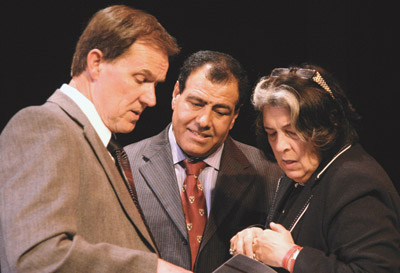Canadian Mennonite
Volume 13, No. 20
Oct. 19, 2009
‘Nothing bad from God’
Palestinian doctor speaks of justice and forgiveness on World Peace Day
Waterloo, Ont.
 |
“Just seconds after I left the room, the first shell struck,” Dr. Izzeldin Abuelaish, a Palestinian physician from Gaza’s Jabalaia refugee camp, told three different Waterloo audiences on World Peace Day, Sept. 21.
As a doctor of obstetrics and gynecology, the Israeli-trained doctor had left his home on Jan. 16 to speak live to Israeli television journalists about women’s health issues. The journalists were waiting nearby to interview him, but turned instead to the devastation being wrought by the Israeli military during their much-criticized incursion into Palestine at the beginning of the year. Their live coverage captured for the first time the lethal toll being taken by Gaza’s civilian population.
Abuelaish, now a public health professor at the University of Toronto, first spoke to 56 Grade 11 students from Rockway Mennonite Collegiate in Kitchener and the United Mennonite Educational Institute (UMEI) in Leamington at Conrad Grebel University College, then to one of the college’s peace and conflict studies classes in the afternoon, before addressing a public meeting that evening at the University of Waterloo.
“Nothing bad from God. Bad comes from human beings,” was Abuelaish’s frequent refrain as he described finding the bodies of three of his six daughters and a niece after the second shell hit his home.
He screamed in anguish, but quickly moved on. “Don’t deal with the dead. As a doctor that is a waste of time and energy. Deal with the living,” he said.
So he went back and spoke to the journalists. The next day Israel declared a unilateral ceasefire.
Abuelaish is convinced his daughters’ deaths saved many other lives. Both before and after this event he worked for mutuality and understanding between Israelis and Palestinians. “We share 98 percent of our DNA,” he said. “We need to focus on what we have in common and work at the differences later.”
When asked at the evening lecture whether he supported a one- or two-state solution in Palestine, he answered, “First get the baby born, then worry about their future.”
People’s needs repeatedly were his focus. “Justice is when I want for you what I also want for myself,” was his response to a question. About the tank commander who shelled his house he asked rhetorically, “What goes on in his mind thinking about whom he has killed?”
He does not seek revenge, but rather healing.
Abuelaish worked in Tel Aviv with his Jewish medical peers and managed to have his wounded daughters moved there for care. The hospitals in Gaza, the most densely populated place on earth, were overwhelmed with more than 6,000 other wounded civilians. The doctors there managed to save one daughter’s eye and reattach the fingers of her hand.
Vanessa Snyder-Penner, a Rockway student, was impressed by Abuelaish’s bridge building between Israelis and Palestinians, his ability to find humanity in every person.
Mat Suta of UMEI was impressed that Israelis recognize Abuelaish’s contributions in Israel and that, at the same time, Palestinians are proud of him.
As a practising Muslim, Abuelaish says, “Faith has a positive impact in my life. Thanks be to God. Why me? Why my daughters? For good. Lives were saved through my loss.”
Nominated for the 2009 Nobel Peace Prize, Abuelaish is the inspiration behind the Daughters for Life Foundation that develops programs promoting education, health and leadership for the women and girls throughout Gaza and the Middle East.